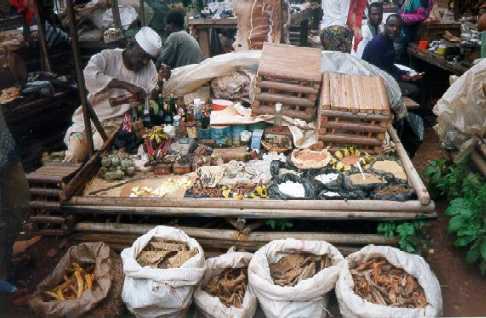
Peace Corps's Relationship To CARPE in Cameroon
Peace Corps's Relationship To CARPE
Partner Focus: The goal is to build the capacity of young people and adults in the Congo River Basin to improve and conserve community environmental resources. Peace Corps Volunteers serving in Gabon and Cameroon today work to develop, disseminate, and use environmental education materials to increase environmental awareness, knowledge, and action in schools and communities. Volunteers also work with community partners to enhance the ability of farm families to adopt sustainable land use techniques such as the integration of leguminous, nitrogen-fixing plants in cropping systems. The overall purpose of this work is to assist the development of a cadre of biodiversity conservation leaders in Gabon and Cameroon.
A basic principle of the Peace Corpsí approach is that communities in the Congo River Basin must be an integral part of any conservation effort. Volunteers typically engage in non-formal education related to natural resource management and community action. Since October 1998, men and women farmers in Gabon and Cameroon working with Volunteers have established more than 250 agroforestry demonstration sites and more than 100 nurseries for the production and sale of tree seed. There are now 18 farmers able to produce enough tree seed for themselves and sell the surplus to other farmers. In addition, community members working with Volunteers have established 20 training gardens, 12 small-scale animal husbandry demonstration sites, six alley cropping educational venues, and five school gardens where children learn about vegetable and tree production. As a result of this work, the Peace Corps has identified several principles that guide the current project activities of Volunteers in the Congo River Basin:
Projects should address a principal need of communities and host governments. For this reason, Volunteers and their partners have focused on food production and growing trees.
Active stakeholder participation is key to project success. This is why men and women farmers are the major contributors to planning, monitoring, and reviewing community activities.
Local partner models help address sustainability issues. An emphasis on building leadership with individual farmers and farmer networks helps ensure that community action is sustainable.
Flexible project structures are more effective. Project structures are strengthened through collaboration with existing institutions like primary schools and non-government organizations.
Nurturing links between income generation and sustainable resource management has significant potential for realizing positive conservation impacts at the local level. Because most people in communities of the Congo Basin gain their livelihood from the forest, directly or indirectly, economic planning needs to consider mechanisms and options by which people can regenerate nearby forest resources even as they use the forestís products for food and income.
Jonathon Landeck Center for Field Assistance and Applied Research The Peace Corps/Washington tel: (202) 692-2652; fax: (202) 692-2653 E-mail: jlandeck@peacecorps.gov
Back to the top